These days, when many of us work remotely, it’s so important to be able to connect with people through online meetings. Storyals productivity experts conducted a workshop on how to “Lead more engaging meetings using Teams” and here are some of the questions we got during the session.
We walked through how to prepare the meeting setup by configuring the meeting options, how to create a professional meeting experience by using Spotlight, Together mode and various background, how to visualize your message using Video, PowerPoint, Whiteboard and Forms, and finally, how to master tools like Whiteboard, Polls and Breakout rooms to engage the audience.
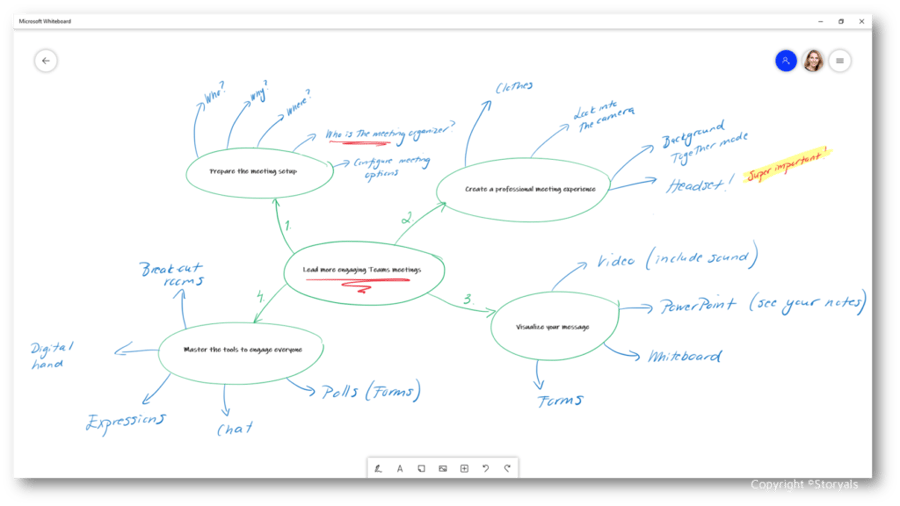
Everyone in the workshop was super engaged and had SO MANY questions. We didn’t have time to answer them all, so here are more answers.
Would you be interested in booking a workshop with one of our productivity coaches? Get in touch with us today!
Q: Can I create the breakout rooms in Teams before the meeting starts?
A: Unfortunately, you can’t (yet), you need to do it during the actual meeting. You can track this feature on Microsoft’s Public Roadmap here.
Q: As I understood, only the organizer can set up and start breakout rooms. Isn’t it possible to delegate this to a presenter or kind of moderator? / I organize meeting for my boss from his calendar, but I need to be the one that does all the breakout rooms. Does that work?
A: Unfortunately, you cannot delegate the breakout room management to someone else, which makes it a bit tricky to book meetings on someone else’s behalf . However, it’s on the roadmap and should be coming soon
. Keep an eye on the roadmap here.
Q: How do I turn off the meeting pop-up chats?
A: The pop-up chats are called “Banners” in Teams. To turn them off for all meetings, go to your profile picture and click: Settings – Notifications. Under “Meetings” click “Edit” and then change the “Meeting chat notifications” drop-down to “Mute”.
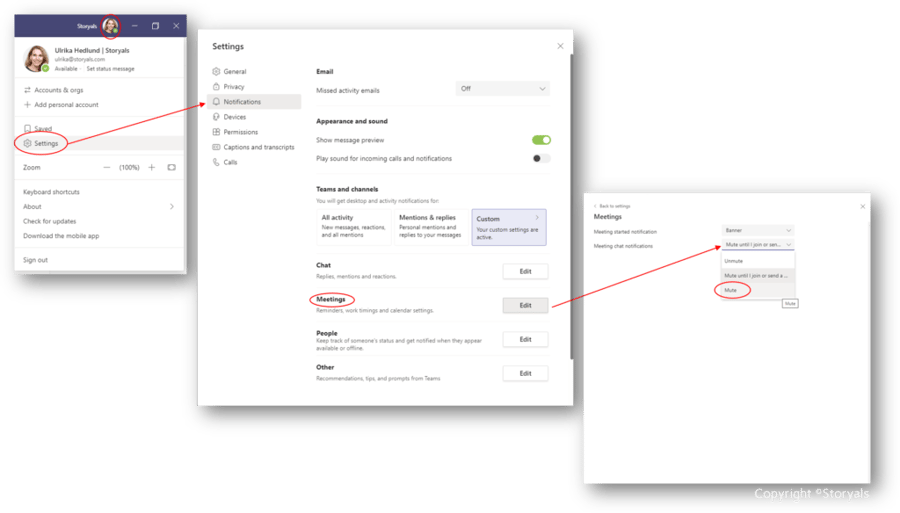
Q: Can you show the presenter and the presentation at the same time in the main window?
A: Currently you are a bit limited in the way you as a meeting attendee view the content. A new “Presenter mode” is soon coming to Microsoft Teams. With this new mode, you will have various options for seeing the presenter and the presentation at the same time. “Standout”, shows the video feed of the presenter in front of the presentation. “Reporter” shows the presentation above your shoulder just like in the news on TV. “Side-by-side” displays the presenter next to the presentation. You can learn more about it here.
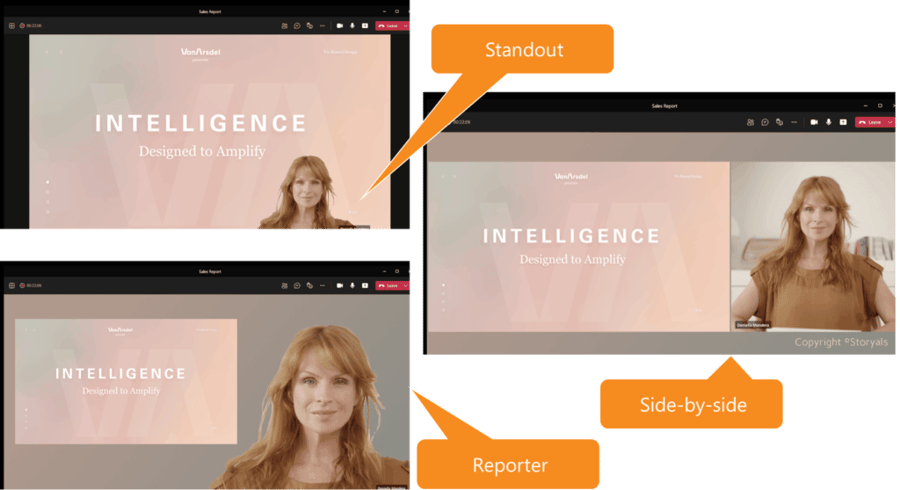
Q: When I show my presentation using the Presenter View in Microsoft Teams, will I be able to use the pointer?
A: Currently this is not supported in the Presenter View. If you need to show the pointer you can put your presentation in Slideshow mode and then select to share that window only. That way, you can see the presenter view and access the laser pointer, but your audience only sees the slide with the laser pointer.
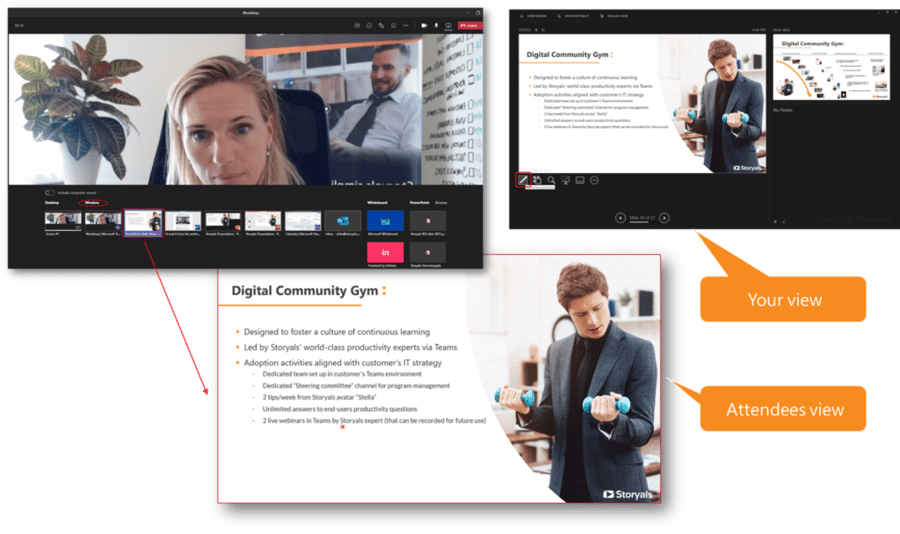
Q: Is Whiteboard always available? Or only for the presenter?
A: Microsoft Whiteboard is available by default (unless your administrator has disabled it). You need to be a presenter to share your screen and activate a Whiteboarding session. You can use Whiteboard in different ways.
- You can use Whiteboard as a visual tool and show the audience a whiteboard that you have already created in advance. To do this, open the Whiteboard app on your computer and share the Whiteboard under the heading “Window”.
- You can use a new blank Whiteboard linked to the meeting. To do this, open Whiteboard under the heading “Whiteboard”. A new whiteboard will be created linked to the meeting and available to everyone in the meeting chat as a tab. Please note that for people to be able to see and collaborate they currently need to be within your own organization.
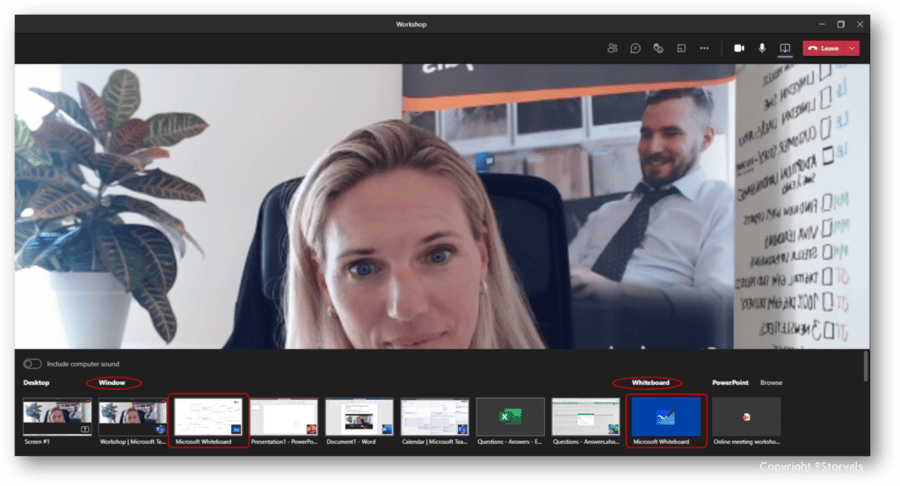
To learn more about using Whiteboard effectively in meetings, read our blog post.
Q: When you have a team in Teams, is it possible to link one whiteboard into all the team meetings that this team has?
A: If you want to always use the same whiteboard, don’t use the Whiteboard under the “Whiteboard” heading. Instead, share the whiteboard under the “Window” heading, select your shared team whiteboard and then share the link (in the chat) so that everyone is working on the same whiteboard. To generate a sharing link to a whiteboard click “Invite someone” and then “More options” and then “Create sharing link”.
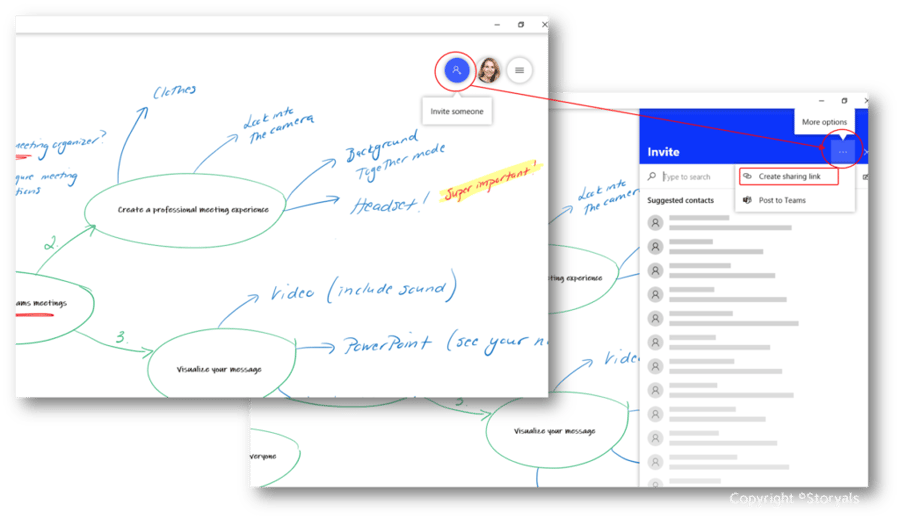
Q: What are other tools you can use to engage the audience?
A: In addition to the many great apps (Forms, Whiteboard, PowerPoint, etc.) in Microsoft 365. I often use Padlet as a tool for people from anywhere to collaborate online in a meeting by having a simple “wall” they can add notes to. Other recommendations of good tools to add more collaborative engagement include Kahoot, Mentimeter, Klaxoon and Miro.
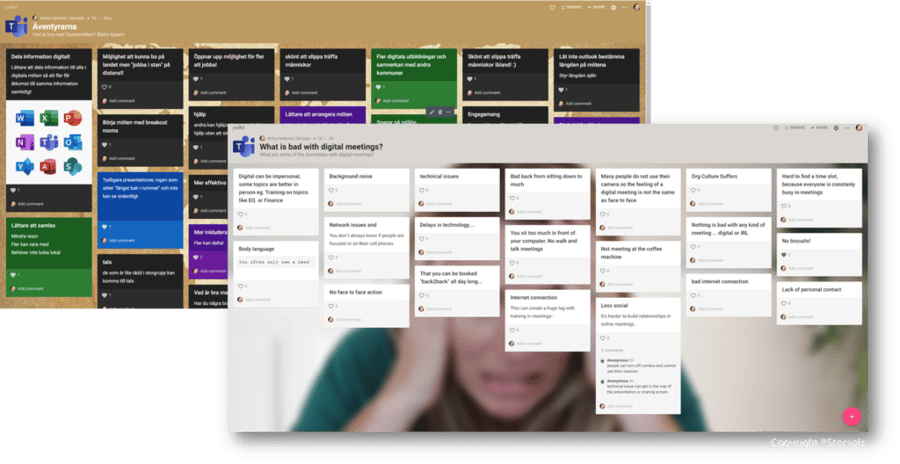
Q: Is the meeting recording save with the organizer? I thought it would be the one who started the recording?
A: You are correct, the video file of the recorded meeting is saved in the OneDrive folder of the person that started the recording. If the recorded meeting is in a shared channel the video will end up in that channel’s SharePoint folder. Read more about meeting recordings here.
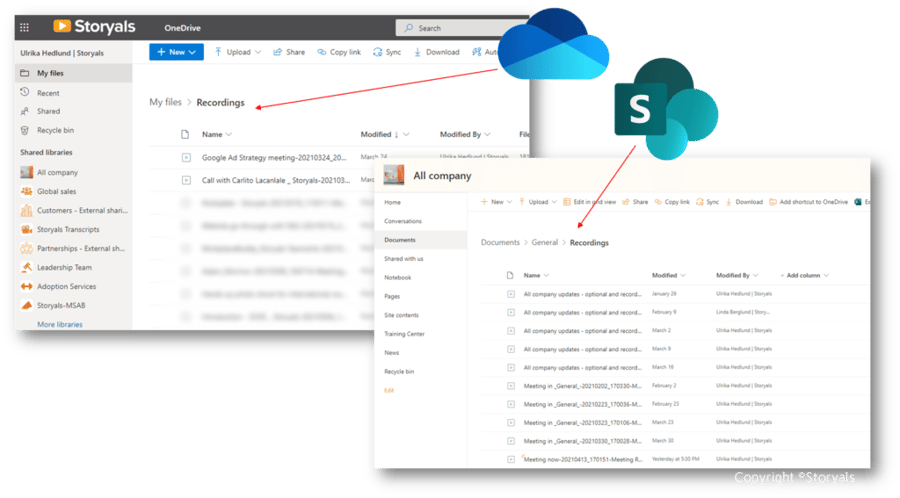
Q: Do you know if Microsoft will allow sharing videos from Stream? (They are re-designing it but not sure if the roadmap includes this external sharing option)
A: Yes, Microsoft has shared that Stream will be able to support external sharing in the “new” Stream vision:
Stream leverages the power of SharePoint content services to store and manage video using integrated Microsoft 365 compliance, governance, permissions, external sharing, go local storage, bring your own keys, and government environments.
You can read more here about the “New Stream.” Not sure when it would be available though…
Q: What are the differences between using the Teams desktop app on a Mac vs a Windows device?
A: There shouldn’t be a major difference when using the Teams desktop client on Mac or Windows devices. Full audio and video are supported in major browsers including Chrome and the new Microsoft Edge. Although this does not include the Safari browser in macOS devices.
Q: How come I cannot “@” other guests in here? Someone “@”ed me and I want to reply. Yes, I am on a Mac.
A: You can only @mention someone (even external) if you are part of the organization that set up the original meeting in the meeting chat.
Q: How do I turn off the sound on the chat so I don’t hear every time someone posts a chat message
A: Click on the Chat in your Teams window for the Chat you would like to mute, click on the 3 dots on the far right of the chat and select “Mute”.
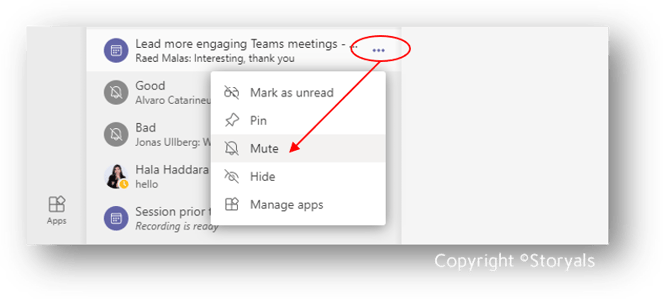
Q: Can people outside my organization be a participant in a webinar?
A: Yes you can invite anyone to a Teams Meeting, Teams Webinar or Teams Live event. However, if you want to use the registration form that comes with Teams webinars for external participants, your IT administrator must run a PowerShell command to enable this. Learn more here.
Q: Is the whiteboard function – standard functionality and will you please share how we can access it?
A: The whiteboard is an app (there is also a desktop app version if you are on an android/non-Mac computer) that you can download for free as part of the Microsoft 365 suite Get Microsoft Whiteboard – Microsoft Store. You can add an existing or create a new Whiteboard inside a Channel. You can do this by clicking on the Channel you would like to add the Whiteboard and click on the + and add the Whiteboard icon and name it – this will now accessible to anyone in the channel. You can learn more about using Whiteboard in our blog post Take your meetings to the next level with Microsoft Whiteboard.
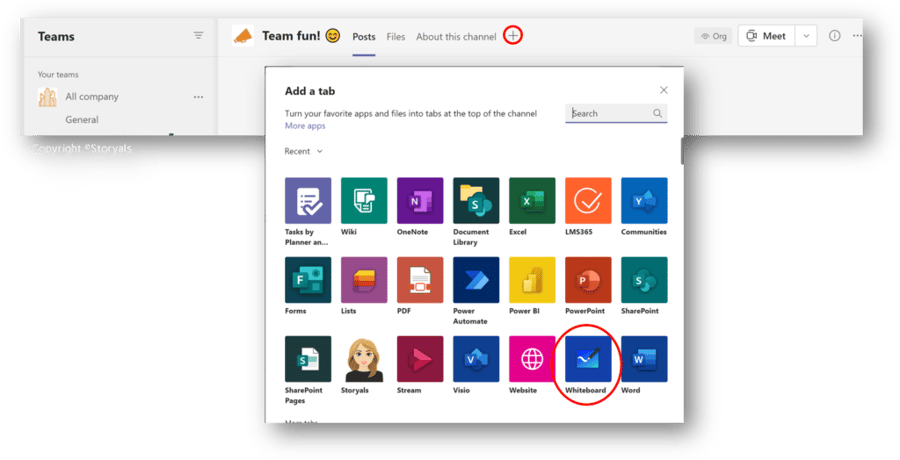
Q: Is it possible to change the meeting organizer? People leaving the organization own the meeting and need to make changes to the attendee list etc.
A: No, unfortunately, you cannot switch meeting organizers. The best option would be to have an IT admin delete the meeting on behalf of the person who left the organization and then have a new organizer set up a new re-occurring meeting.
Q: Can you please share a recommended headset for meetings?
A: We recommend browsing Microsoft Teams certified devices and choose a headset you prefer.
Q: How do you get Together Mode?
A: There should be at least four participants from the same tenant to enable Together Mode in Microsoft Teams. Together mode stays greyed out until a fourth participant joins the call.
Q: How long are chat meetings along with transcripts and documents kept after a meeting ends? Forever or limited time?
A: Any document sent via any chat including meeting chat will be saved to your OneDrive – Microsoft Chat folder and the chats themselves will be saved by default forever unless your company changed the default.
Q: It’s sometimes a challenge to pick the right screen to share during a meeting if you’re trying to work through screens on your computer.
A: Yes this is a bit tricky. A good tip is to close down the Windows that you plan not to show during the meeting. The new sharing tray makes it a bit easier to select between sharing your whole screen, a specific window, a Whiteboarding session or a presentation via PowerPoint Live. When you click the share button in Teams, your view should look like the below screenshot – when you click on “Window”, you should have a clearer view as to which window you would like to share.
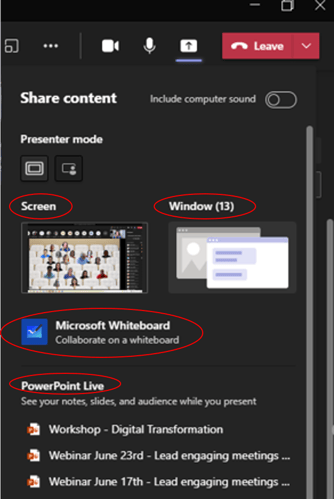
Q: We have a weekly recurrence Management Meeting and from time to time we invite others from our organization to present a topic. They are then automatically added to our chat, which we don’t want. After the meeting, I need to manually take them out of the chat. Is there a way to add them to the meeting but not give them access to the chat?
A: Unfortunately, if the users are within your own organization, there is no way to configure this setting in the meeting options. You do need to go into the Meeting Chat and manually remove them from the Chat as you are currently doing today.
Do you have more questions?
Helping organizations build digital skills is what we do for a living. Please check out our other blog posts and make sure to sign up for our newsletter so you don’t miss upcoming workshops, webinars and blog posts. Good luck in leading more engaging meetings in Microsoft Teams!
